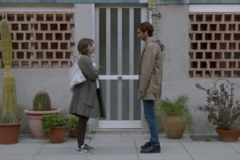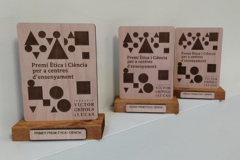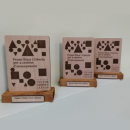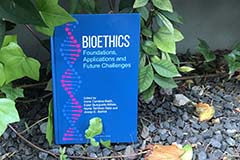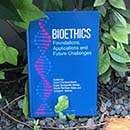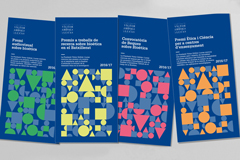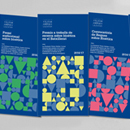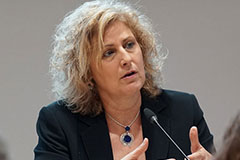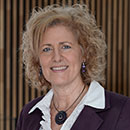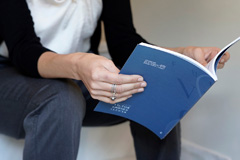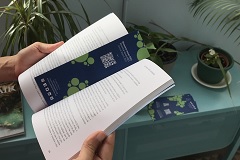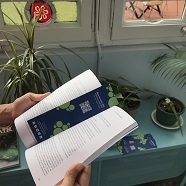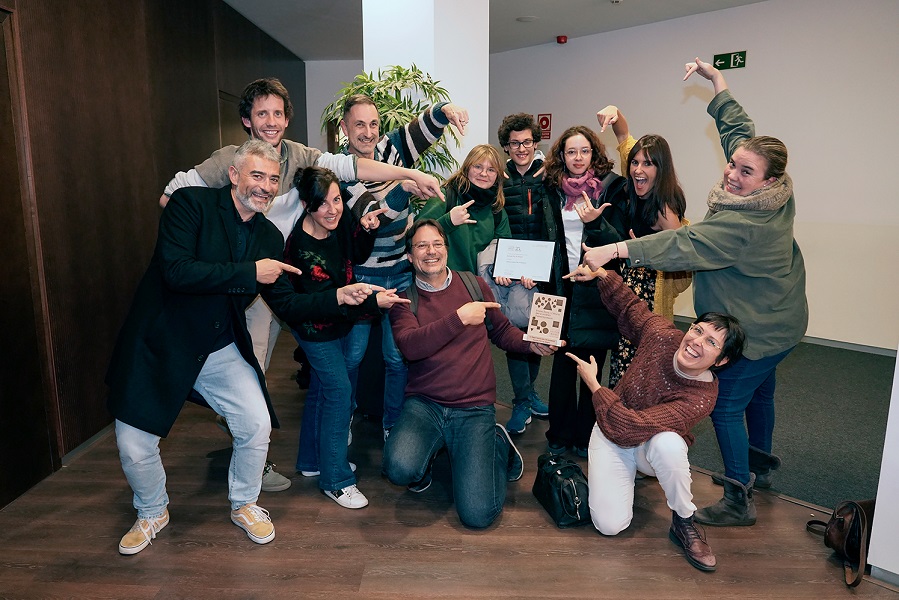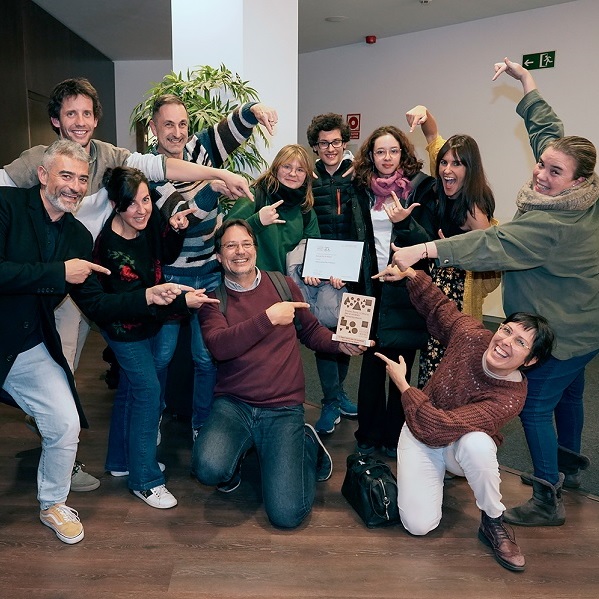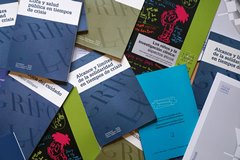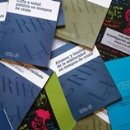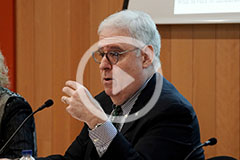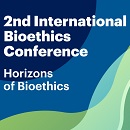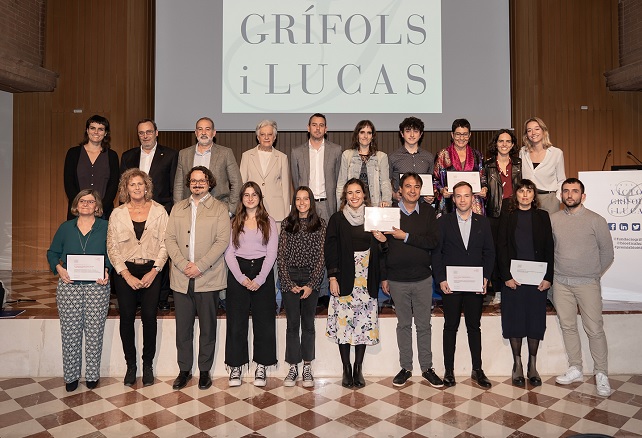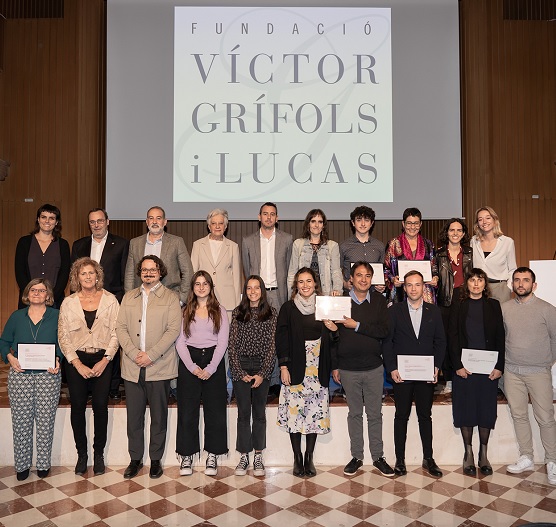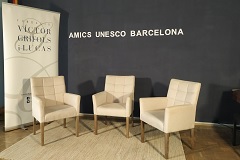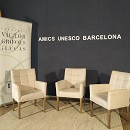Mamífera” and “Mi sextorsión” films premiére
Two recipients of our Bioethics Audiovisual Award are coming to the big screen. The first film, “Mamífera” (She-Mammal), directed by Liliana Torres, is set to première in Barcelona on April 25, and the second film, titled “Diario de mi sextorsión” (Diary of my sextorsion), by Patrícia Franquesa, will be featured in the lineup as part of the Barcelona Docs festival in May.
“Mamífera”, recipient of the 2022 Audiovisual Award, tells the story of a couple facing an unplanned pregnancy. The film explores the myriad social factors surrounding motherhood, advocating for the right to choose not to become a parent.
Meanwhile, “Diario de mi sextorsión”, winner of the 2020 Audiovisual Award, explores the director’s personal experience with extortion. The film documents the aftermath of the theft of her laptop, which led to the circulation of intimate photos among her contacts. The film challenged the illusion of security surrounding our personal data and explores the vulnerability we often overlook.
Our Audiovisual Bioethics Awards are bestowed annually, recognizing films in the developmental stage that explore themes related to bioethics. This often serves as the initial step towards securing funding and commencing production. Some projects may take two or three years to come to fruition, while others never materialize due to insufficient support or funding. This makes it particularly significant in this case, as two of the awarded projects are now coming to the big screen.
Other recipients of these awards include “Bailar la locura” (Dancing madness, awarded in 2019) and “Ponto Final” (2021 special mention).
The call for abstracts for bioethics awards and grants wil be open until 31 May. You can register online and submit projects via our website.
The Awards Jury has announced this edition’s winning projects
This year’s winning entries are:
- First Prize, worth 5,000 euros, for “Apocalipsis digital” (Digital Apocalypse), a project submitted by the Institut Vapor del Fil, Barcelona.
- Second Prize, worth 2,500 euros, for “L'intercanvi blau” (The Blue Exchange), a project submitted by the Institut Escola La Tordera, Santa Maria de Palautordera (Barcelona).
- Third Prize, worth 1,000 euros, for “Recuperació de l’escarola perruqueta” (Recovery of Local Escarole), a project submitted by the Escola La Parellada, Santa Oliva (Tarragona).
Congratulations to the winning schools and heartfelt gratitude to all who submitted their entries to this edition.
These activities mark the kickoff of our events for the year:
• Course entitled “On Birth and Dying” in collaboration with the Ateneu Barcelonès on ethical issues in science (7 February to 3 April).
• Film and discussion to encourage bioethical thought among high school students, in collaboration with the Americana Film Fest and the Department of Education of the Generalitat of Catalonia (6-7 March) .
• Online introductory bioethics course: the goal of this course is to provide the tools to identify and analyse ethical conflicts in professional practice. In collaboration with UVIC-UCC.
• A new edition of the cycle “Spaces for reflection”, organised in collaboration with Amics per a Unesco of Barcelona (Friends of the Unesco, Barcelona) for the discussion of human rights issues.
Stay tuned for updates with more details about the topics to be covered, along with the dates and times for these events.
New book published in collaboration with the Fundació Grífols Chair in Bioethics
Routledge has just published "Bioethics: Foundations, Applications and Future Challenges", a book centred on bioethics from three perspectives: its foundations, the current debate in healthcare bioethics, and the future challenges of this discipline.
This book features contributions from leading experts in bioethics and regular contributors to the Víctor Grífols i Lucas Foundation such as Lydia Feito, Màrius Morlans, Begoña Román, Salvador Macip, Chris Willmott, Juan Pablo Beca and Marc Antoni Broggi.
Josep Eladi Baños (Dean of the UVIC-UCC) participates as editor, along with experts from the Fundació Grífols Chair in Bioethics: Núria Terribas (Director), Ester Busquets (Coordinating Editor) and Irene Cambra (Researcher).
Geared towards students and professionals working in fields related to health sciences, philosophy, psychology, and education, this book caters to both newcomers seeking an introduction to bioethics and those with a keen interest in delving into the latest topics in the field.
The Bioethics Awards and Grant research Jury has announced the winning projects for this year’s edition
Research Grants
- The team led by Carme Isern from the Universitat de les Illes Balears for its project entitled “Las bases cognitivas de la injusticia epistémica en la atención sanitaria” [The cognitive basis of epistemic injustice in healthcare].
- The team led by Sara Domènech from the Fundació Salut i Envelliment of the Universitat Autònoma de Barcelona [Foundation for Health and Ageing UAB] for its project “Aspectos jurídicos y éticos de la aplicabilidad del robot Pepper en la interacción con personas mayores en el ámbito residencial: un estudio piloto” [The legal and ethical implications of the use of the Pepper robot in interactions with elderly persons in residential care: a pilot study].
- The team led by Laura Esteve from the Pompeu Fabra University for its project “Los derechos de las mujeres gestantes: entre expectativa y realidad: Un estudio jurídico sobre violencia obstétrica” [Expectations, reality and the rights of pregnant women: A legal study on obstetric violence].
- Marcos Alonso from the Complutense University of Madrid for his project “Cuidados e indentidad personal. La importancia de la atención a la identidad personal en los cuidados” [Care and personal identity: The importance of personal identity in care].
- The team led by Mónica Fernández from the Biocruces Bizkaia Health Research Institute for its project “Proyecto SINHOPAL-3S. Barreras y facilitadores al acceso a cuidados paliativos en las personas sin hogar: la visión de los profesionales del tercer sector social” [The SINHOPAL-3S Project. Barriers and facilitators in access to palliative care for the homeless: insights from third sector professionals].
- The team led by Guillermo García from the Autonomous University of Barcelona for its project “Neurociencia, filosofía y educación; Un encuentro para que pacientes con lesiones neurológicas dialoguen sobre la enfermedad con científicos en formación” [Neuroscience, philosophy and education: an opportunity for patients with neurological injuries to discuss their disorders with scientists in training].
Secondary school prizes
- First prize for “A tocar d'un món feliç” [Almost a Brave New World] by Júlia Fontserè from La Salle Manlleu.
- Second prize for “Un bon metge o un metge bo?” [A good doctor or a doctor (who is a good person)?] by Anna Bellavista from the Escola Pia in Granollers.
- Third prize for “Bioètica i reproducció humana. Reescrivint el genoma” [Bioethics and human reproduction: rewriting the genome] by Laia Chillarón from the Escola Maristes Anna Ravell.
Audiovisual Award
- The film “El Tribunal” [The Board] by Carmen García Tortosa, produced by Barrios Producciones and Gadol Producciones.
A total of 34 scholarship applications, 146 audiovisual projects and 13 secondary school projects were received. The jury extends its gratitude to all those who submitted projects and warmly invites them to join future editions.
Diari Ara newspaper in conversation with foundation director on surrogate maternity, euthanasia, and advance directives
Watch an insightful interview with Núria Terribas as she discusses topics of current relevance in bioethics, including surrogate maternity, a subject that captured widespread attention in light of the recent case involving Spanish celebrity Ana Obregón. As member of the Euthanasia Assurance and Evaluation Committee, Terribas provides valuable information about the process and its application. Finally, she reflects on the management of the pandemic three years on.
This monograph explores the societal impact of AI, with particular focus on its application in the field of health. While this technology offers many technical benefits, it’s important to take a step back and look beyond them to critically examine its effects on individuals.
Featuring a panel of authors, this publication tackles a range of thought-provoking questions, such as: What is the effect of artificial intelligence on patient autonomy? Are diagnostic algorithms safe? Does this technology pose a threat to the confidentiality of patient information? Who holds the responsibility for any errors that may arise in its use?
Books that deal with ethical conflicts arising from new forms of reproduction
Surrogate motherhood has been a popular topic in recent weeks and we would like to recommend three readings that analyze the issue from different yet still current perspectives:
- La subrogación uterina: análisis de la situación actual
- Treinta años de técnicas de reproducción asistida
- Pensar la maternidad
Education centres from Sitges, Blanes and l'Hospitalet de Llobregat have been awarded.
The winners of the Ethics and Science Awards for educational establishments were announced at the awards ceremony.
First prize to Escola Pia Sitges for "Amb la vida a les butxaques".
Second prize to Escola Mossèn Joan Batlle (Blanes) for "Plàstic 0".
Third prize to Institut Bellvitge (Hospitalet de Llobregat) for "COMUNICACIÓ: Ètica, Ciència i Tecnologia".
Special mention to Escola Aldana (Barcelona) for "L'amistat no té edat".
The call for abstracts for bioethics awards and grants wil be open until 31 May. You can register online and submit projects via our website.
- Grants
- Secondary high school prizes
- Audiovisual awards
- Registration for Ethics and science prize will be open until November 30
There are numerous initiatives designed to provide support for elderly people who live alone. Instruments based on artificial intelligence algorithms, social robotics, and apps relating to health or social issues... Are these all valid and do they reflect people's needs? Do they respect the autonomy and privacy of the citizens to whom they are addressed?
With the participation of: Jaime del Barrio, Óscar Belmonte, Antonio Caballer, Carme Torras, Carme Pratdepàdua, Ibán García, Oriol Farrés and Dolors Comas d'Argemir.
Vídeos of the lectures delivered at the congress:
- Opening lecture "Bioethics challenges for the 21st century" by Joseph J. Fins
- Panel discussion 1. Impact of biotechnologies: health and well-being
- Panel discussion 2. Applied ethics in a society between pandemics
- Panel discussion 3. Challenges of teaching bioethics
- Panel discussion 4. Discomfort with death: transhumanism vs. euthanasia
- Closing lecture "Bioethics after pandemics" by Victòria Camps
The Bioethics Awards and Grants Jury has announced the winning projects for this year’s edition
Grants
- The team led by Núria Masnou from the Dr. Josep Trueta University Hospital of Girona for its work entitled “Anàlisi de la relació del personal sanitari amb la mort a partir de l’aplicació de la LORE” (Analysis of healthcare workers’ attitudes towards death based on the application of LORE - the Spanish Organic Law 3/2021 of March 24 regulating Euthanasia)”.
- M. Esperança Ginebra, Elena Lauroba and Joan Escarrabill from the University of Barcelona for their work “Consentimiento informado y toma de decisiones compartidas: construcciones jurídicas y experiencias médicas para salvaguardar la autonomía de los pacientes” (Informed consent and shared decision-making: legal constructions and medical experiences to safeguard patient autonomy).
- Juan Francisco Roldán’s team, from the Fundació de Recerca Sant Joan de Déu (Sant Joan de Déu Research Foundation) for its work entitled “Adaptación y validación del cuestionario Inpatient Dignity Scale (IPDS) Estudio Multicéntrico” (Adaptation and validation of the Inpatient Dignity Scale [IPDS]: A multicentre study).
- Mar Vallès, Iris Parra and Ramón Ortega from the University of Granada, for their project “Narrativas de final de vida de pacientes que solicitan la ayuda para morir” (End-of-life narratives of patients requesting assistance in dying).
- Adrián Villalba and Miguel Moreno from the University of Granada for their work “Gametos artificiales o cómo nos reproduciremos mañana: Un marco normativo para determinar la moralidad” (Artificial gametes or how we will reproduce tomorrow: a regulatory framework to determine morality).
- The team led by Jaime Fons of the Foundation for the Promotion of Health and Biomedical Research of the Valencian Region (FISABIO) for its work “Portal del donante: herramienta digital para mejorar el proceso de consentimiento informado en la donación de muestras biológicas con fines de investigación.” (The Donor Portal: a digital tool to improve the informed consent process for the donation of biological samples for research purposes).
Secondary school prizes
- First prize for the project entitled “CRISPR les tisores moleculars amb què podràs tallar l’ADN” (CRISPR: molecular scissors to edit DNA) by student Lúa Abad from the Escola Pia Balmes School in Barcelona.
- Second prize for “Artificial Intelligence: the (r)evolutionary way to transform medicine” by student Andrea García from Col·legi Diocesà Sagrada Família School of Tortosa.
- Third prize for “Bioètica i mort digna” (Bioethics and dying with dignity) by student Ovidi Mallafré from Anna Gironella de Mundet Secondary School.
Audiovisual Award
- For the feature film “La dona invisible” (Invisible woman) by Carla Sospedra, produced by Edna Cinema.
- Honourable Mention: for the documentary “Les culpables” (The Guilty Ones) by Montse Pujol and produced by Boogaloo Films.
A total of 26 grants applications, 92 audiovisual projects and 19 secondary school projects were received. The jury appreciates the participation of all those who submitted projects and encourages them to take part in future editions.
After the summer holidays, we resume the cycle of lectures we organize with Barcelona Friends of UNESCO, with talks on topics including transsexuality, vaccination and organ donation.
Here is the schedule of lectures for the second half of 2022:
05/10 at 18:30 h. – Sex and gender: transsexuality as a reality
Sabel Gabaldón Fraile, child psychiatrist at San Juan de Dios Hospital and expert in bioethics and gender variability.
09/11 at 18:30 h. – Vaccines and globalization
Andreu Segura, Coordinator of the SESPAS Ethics and Public Health Working Group Group.
14/12 at 18:30 h – Altruism and organ and tissue donation: do we need to revise these concepts?
Núria Terribas, Director of the Víctor Grífols i Lucas Foundation.
The lectures will be held in person at the premises of Barcelona Friends of UNESCO (c/ Mallorca, 207)
Find out more! Registration opens shortly.

